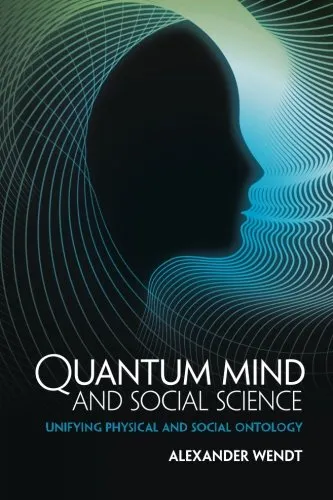Quantum Mind and Social Science: Unifying Physical and Social Ontology
5.0
Reviews from our users

You Can Ask your questions from this book's AI after Login
Each download or ask from book AI costs 2 points. To earn more free points, please visit the Points Guide Page and complete some valuable actions.Introduction to "Quantum Mind and Social Science: Unifying Physical and Social Ontology"
"Quantum Mind and Social Science" is a groundbreaking book that bridges the gap between two seemingly disparate fields: quantum physics and social science. Written by Alexander Wendt, this work explores the revolutionary concept of applying the principles of quantum mechanics to understand the dynamics of human consciousness and social reality. By taking an interdisciplinary approach, the book offers profound insights into how individuals and societies interact with the world, proposing a unified ontology that integrates the physical and social realms.
This book challenges traditional views of human agency, free will, and determinism. Wendt proposes a rethinking of how we conceptualize the mind, agency in the context of quantum theory, and the causal relationships in social systems. It raises provocative questions about the nature of reality and offers a fresh perspective on human behavior. Through rigorous arguments, Wendt provides a bold alternative to the classical Newtonian view of the social world, inviting readers to rethink the foundations of social science as we know it.
Detailed Summary
At the heart of "Quantum Mind and Social Science" is the idea that quantum mechanics can provide a more accurate framework for understanding the mind, consciousness, and society than classical physics. Wendt argues that human consciousness itself has a quantum nature and that this framework has significant implications for social ontology—the study of the structures of social reality.
The book systematically builds a case for the adoption of quantum principles, starting with the limitations of classical physics and its deterministic worldview when applied to human and social sciences. Wendt introduces readers to essential concepts of quantum theory, such as superposition, entanglement, and non-locality, and demonstrates how they can be used to model social phenomena more effectively.
Quantum mechanics suggests a world rich with potentiality and interconnectedness, which aligns closely with the fluid and uncertain nature of human decision-making, identity, and relationships. Wendt bridges this with social science by arguing that human beings exist as "quantum systems" and that social interaction can be better understood as a web of entangled relations rather than isolated cause-and-effect events.
The book ultimately proposes a paradigm shift. By integrating quantum principles with the study of societies, Wendt provides a unified ontology that resolves enduring philosophical dilemmas about agency and structure, free will versus determinism, and mind-body dualism.
Key Takeaways
- Quantum mechanics can unify the study of physical reality and social structures.
- The concept of "quantum consciousness" redefines human agency as probabilistic, non-local, and interconnected.
- Deterministic models of classical physics are insufficient for capturing the complexities of human and social life.
- Social systems can be understood as entangled structures, challenging conventional cause-and-effect models.
- The book introduces a novel framework for reconciling physical science and social theory into a cohesive paradigm.
Famous Quotes from the Book
"The mind is not a classical computer, and neither is society."
"Quantum theory may offer a deeper understanding of human consciousness, the fundamental driver of social behavior."
"It is time to abandon the false dichotomy between the physical and the social. They are one and the same."
Why This Book Matters
"Quantum Mind and Social Science" is more than an academic exercise—it is a bold rethinking of how we understand ourselves and the world we live in. The book addresses foundational questions at the intersection of physics, philosophy, and sociology, leaving a profound impact on multiple disciplines.
By proposing a unified framework, Wendt aims to resolve long-standing debates about the nature of consciousness, agency, and social systems. His work invites practitioners, researchers, and students across disciplines to adopt a quantum-based perspective that challenges deterministic and reductionist paradigms.
This interdisciplinary approach has the potential to transform how scientific research is conducted across both the natural and social sciences. It encourages readers to explore new methodologies that are better suited to capturing the complexity and uncertainty inherent in human life. Ultimately, "Quantum Mind and Social Science" is a visionary work that advances our collective understanding of the universe and our place within it.
Free Direct Download
Get Free Access to Download this and other Thousands of Books (Join Now)
For read this book you need PDF Reader Software like Foxit Reader
Accessing books through legal platforms and public libraries not only supports the rights of authors and publishers but also contributes to the sustainability of reading culture. Before downloading, please take a moment to consider these options.
Find this book on other platforms:
WorldCat helps you find books in libraries worldwide.
See ratings, reviews, and discussions on Goodreads.
Find and buy rare or used books on AbeBooks.


